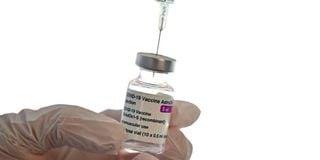Kenya to get 72,000 Covid vaccine doses returned by South Sudan

A health worker prepares a dose of the AstraZeneca/Oxford vaccine at a coronavirus vaccination centre at the Wizink Center in Madrid on May 12, 2021.
What you need to know:
- In March, South Sudan received 132,000 doses from Covax but the country’s national taskforce on Covid-19 decided to return before they expire after discussing the matter with the World Health Organization (WHO).
Kenya is set to receive a consignment of 72,000 AstraZeneca/OXford vaccine doses that South Sudan returned to the Covax facility.
South Sudan says it will return the doses after concluding it cannot administer the jabs before they expire, a health ministry official told AFP on Tuesday.
The country received 132,000 doses of the vaccine in late March from Covax, the global initiative to ensure lower-income countries receive jabs, but so far has administered less than 8,000 shots.
On Tuesday, Kenya’s vaccine taskforce chair, Dr Willis Akhwale, told the Nation that the doses are expected by Thursday.
“I finished doing the paper work this evening ... everything is set. The batch of 72,000 AstraZeneca doses will be here tomorrow or by Thursday,” he said, but noted that Unicef is the one to determine when they will be delivered.
More on this: Malawi destroys 17,000 expired AstraZeneca vaccines
Also read: DR Congo resumes use of AstraZeneca jab
The announcement comes a week after Health Cabinet Secretary Mutahi Kagwe announced that the country had only 100,000 doses of the vaccine left.
CS Kagwe said it was crunch time but asked Kenyans yet to receive their second shots not to panic, saying the first dose offers up to 70 per cent protection.
“We are better off with a first dose than with none. We have not heard of people dying because they did not get the second dose,” he said.
Timelines for getting the second vaccine dose are uncertain due to a shortage occasioned by delays by Covax.
Several challenges
In March, South Sudan received 132,000 doses from Covax but the country’s national taskforce on Covid-19 decided to return before they expire after discussing the matter with the World Health Organization (WHO).
“We are struggling economically … that’s why we have problems funding the deployment itself. We are actually tightening our belts … that’s why hopefully, in the next two weeks, the 60,000 we have will be dispersed all over the country,” said South Sudan’s Health Ministry undersecretary, Dr Mayen Machuot said in a previous interview.
“We don’t want to run the risk of [the vaccine] expiring in our hands. It will be accounted for, so we are committing [to return] 72,000 doses so that they are used by [countries that] can deploy them in one week,” Dr Machuot told reporters at a Juba news conference.
He added that South Sudan failed to use its doses because of a slow initial uptake by health workers, delays by Parliament to approve the vaccine’s use, and a lengthy training of people to administer the vaccine.
The Covax facility wrote back to the South Sudanese government, saying it was happy with the arrangement as the doses would not go to waste.
Remaining doses
South Sudan will be left with 52,000 doses that it hopes to use before the expiration date on July 18.
Once that batch is finished, it will request additional doses from Covax, the ministry said.
As in other parts of Africa, a fear of side effects and rumours the vaccine causes impotence or is otherwise unsafe have spurred wariness about vaccines among the population.
Last month, South Sudan was considering disposing 60,000 expired vaccines it received as a donation through the African telecommunications company MTN and the African Union.
To date, South Sudan has recorded 10,686 cases of Covid-19 and 115 deaths.
China and India's efforts
Meanwhile, India and China are stepping up efforts to help other countries with vaccination.
The Chinese government says Beijing is stepping up support for Africa’s post-pandemic recovery, with initial focus on vaccine access, as a “public good”.
And last week, the Indian government, which is battling a Covid-19 crisis that has seen it suffer shortages of treatment supplies, said it was pooling resources to produce more vaccines of different types.
The country authorised more local firms to take foreign orders and deals to produce Covishield (known abroad as AstraZeneca vaccine), Covaxin (India’s first indigenous Covid-19 vaccine) and Sputnik V, the Russian vaccine; all of which have been authorised for emergency use by the WHO.
The decision, officials said, was a result of soaring infections and inadequate vaccine production by the two main private manufacturers, the Serum Institute of India (SII), which makes AstraZeneca's vaccine, and Bharat Biotech, that makes Covaxin.
Dr Randeep Guleria, an Indian pulmonologist and the current director of the All India Institute of Medical Sciences (AIIMS), told the media that Sputnik V manufacturers had joined efforts with a number of Indian companies in the country to ramp up production of their product.
“New plants [are] being set up by Bharat Biotech and SII by July-August. We will a have large number of doses available in about two months, we will get vaccines from outside too” the director said.






